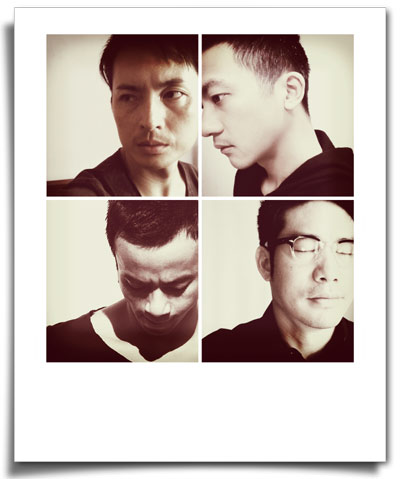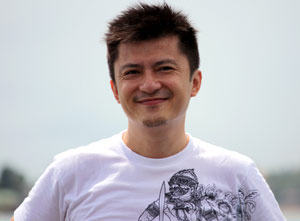Back in 1995, a play called A Language of Their Own went up in New York. It told the story of two gay Chinese-American gay men, Oscar and Ming, whose relationship is torn apart by HIV – how they hurt one another, and how they continue to be haunted by their memories of their love when they find new boyfriends.
The show was a hit – critics and audiences loved the dark humour, the intensity of the emotions, and the way it talked about racial and sexual politics through a convincingly human story. Praises were heaped on Chay Yew, the Singaporean-American playwright behind the piece.
Of course, none of that won over the Singapore government. Censors actually banned the play when the director tried to bring it over on tour the same year. But thankfully, they became a little less homophobic over time: in 2006, the script was finally able to be staged at the Esplanade, with an excellent performance by Checkpoint Theatre – the subject of one of my earliest articles for Fridae.
Now, in 2012, the show’s being performed in Mandarin for the first time ever. It’s been renamed 男男自语 (Nan Nan Zi Yu), and it’s produced by the Singapore Arts Festival. It’s also occupying a coveted spot in the festival’s opening weekend, from 18 to 20 May, when most of the international press will be present.
Chay is pretty thrilled about the staging. “It’s exciting to have my play translated for the Chinese audiences in Singapore, especially when I got in Chinese classes was a ‘B’,” he says. He’s been keeping up with the translation project via Skype, while nurturing young playwrights and directors as the Artistic Director of Victory Gardens Theater in Chicago.
As for me, I’m psyched when I think of how much the civil service-run Singapore Arts Festival has invested in this. It’s confirmation that parts of our government are actually willing to stand up and celebrate gay culture in front of the rest of the world.

From top right (clockwise): Loo Zihan, Timothy Nga, Robin Goh and Nelson Chia.
The men behind the Mandarin
The seeds for A Language of Their Own began back with the 2006 performance of Language. Robin Loon, a playwright and NUS theatre studies professor, watched the show twice, weeping each time. Afterwards, he went out for coffee with the director Casey Lim, and the two discussed the Chineseness of the play – in particular, what would happen to the story if the four characters spoke in Chinese?
Neither one of them clearly remembers who came up with the idea of translating the play. Still, it wasn’t until 2010 that they committed themselves seriously to the project, seizing the opportunity of the Singapore Arts Festival’s theatre development programme, Open Studio.
Robin spent six months on his first draft of his translation, determined to infuse the same sense of rhythm and music into the Mandarin version as there were in the English original. A public reading was held last year, after which the script was further developed – one change, for example, was that the relationship between Ming and his new boyfriend would be performed using English, so as to draw attention to the cultural tensions of being Chinese today.
Surprisingly, the script hasn’t been localised or made contemporary: the characters are still Chinese-American men living in Boston and Los Angeles in the 1990s. There are still references to CDs by Madonna, Whitney Houston and Donna Summer – though that’s not too much of a problem, since the first two are back in mainstream news, after Madonna’s MDNA album and Houston’s death.
Robin isn’t worried that younger viewers will be alienated. “I think the Fridae audience will find a lot empathy with the characters this time around, and their search for their own truths,” he says. “It is, at its very heart, a love story. Don't worry if you don't speak Mandarin or that you have a very bare understanding of it – just sit and listen to the music.”
Fortunately for everyone, it looks like sales are going well. Right now, the show’s been sold out on Friday and Saturday night, and even matinee seats are going fast. There’s also been talk about taking the show on tour, although nothing’s confirmed so far.
For now, however, the cast is concentrating on putting up the best show possible. I sat down for an interview with all four of them last Saturday: the award-winning actor Nelson Chia, the experimental artist-filmmaker Loo Zihan, the DJ-singer-actor Robin Goh and hunky performer Timothy Nga. Here’s what they said.
æ: Age, sex, occupation, location?
Nelson: 39, male, full-time actor, Singapore.
Zihan: 28, all the time, part-time [multimedia arts] teacher, Singapore.
Robin: 41, male, actor and radio DJ for the SAFRA 88.3 FM Morning Show, Singapore.
Tim: 39, preferably once a week, actor/presenter, Singapore.
æ: Nelson, Zihan: you’re playing the lead characters Oscar and Ming. Could you describe them a little?
Nelson: Here’s what I think of [HIV-positive character] Oscar: he's someone who's fragile on the inside but has learnt to put on a strong facade. He loves deeply but is inept in expressing what he feels, kind of a melancholic fellow.
Zihan: Ming is proud, selfish, vulnerable and sexual.
æ: What about the supporting characters: Oscar’s new boyfriend Daniel, and Ming’s new boyfriend Robert?
Robin: Daniel is the guy who sees things as they are, and takes things as they are, without being a martyr about it.
Tim: I would describe Robert as the type of man for whom simple happiness is a major goal. He is a romantic and an idealist and feels that the path to happiness should be uncomplicated, though not necessarily easy. Love is very important to him and once he enters into a relationship, he will give 110% to make things work.
æ: How have you prepared for your roles?
Nelson: I had to abstain from supper. Because Oscar should look a bit lean, and whenever I eat supper, I get bloated. I haven’t had supper for quite some time…
Robin: I’ll take you one of these nights.
Zihan: I watched three hours of My Fair Lady. [The character refers to the movie as helping him to realise he’s gay.] Also finding out all the references, because there are all these American locations mentioned - what does Copley square look like?

Casey Lim
æ: And how are you coping with the translation? [addressing Zihan] I know this play’s been difficult for you, because you’re not used to performing in Mandarin.
Zihan: It’s been especially difficult for Casey! But it’s helpful for my character, because we’re going through the same process. The character of Ming reconstructs himself with language. I’m trying to do precisely that.
Tim: I don’t understand most of it. [Note: His character speaks only in English.] Seriously, yesterday during the run, I was going through the Chinese script, and to me it’s mostly pictures. But yesterday we had our first full run, and I saw how Act One flows into Act Two. It’s quite a revelation.
Nelson: It’s quite different from normal, conversational Mandarin. The way Robin [Loon] has translated it, there’s a lot of poetry in the words. It flows with the rhythm; it’s not exactly conversational, but you have to make it so. And I like the fact that Chay Yew created a new style that lets us play different spaces at the same time. So I’m talking to the audience, to my co-characters, to myself… We go into different spaces: the house, the streets, the train, and all that, evoking emotions, spaces, time, all through our own words.
æ: Should we expect anything risqué in this show?
Director Casey Lim: (interrupting) Nobody is going to strip in this production! It’s just about the heart. I’m trying to refocus it back on the important themes.
Robin: It’s so terrible. Every time it’s a gay play people think clothes will be taken off.
Casey: Yeah. But I also did it before. During my scene [in the earlier version of A Language of Their Own], Oscar also took off his pants and pretended to masturbate while Ming was going to the bathhouse.
Zihan: But like what the director said: it’s stripping away, but not of clothes. It’s of everything else.
æ: Nelson, you previously played John Lee in Chay Yew’s play Porcelain, about toilet cruising in London. Was there anything more explicit there?
Nelson: Yeah, but in the dark. With Mark Richmond. There was some kissing. and there was a blowjob scene. But the lights were kind of dimmed.
Casey: (to cast) Do you want that? Kissing and blowjobs?
Zihan: I think this text doesn’t need it. I was actually relieved there wasn’t anything in this show.
æ: Given that HIV is much more treatable now, are you worried that the play is out of date?
Casey: This play is not really about the politics of HIV, nor is it about gay politics. It’s really about the politics of the heart. If you read the play, Oscar could have been dying of cancer. Interviewers like to ask about the relevance, but in fact it’s about life; it’s about loss; it’s about love.
Tim: But I think even today, HIV changes the life of the person who gets it.
It affects your mental state. You have to face your mortality: suddenly you cannot see your life going on forever. This means a complete change of lifestyle, at least for a couple of years when you adjust and you reach a new normal. But it’s always hanging there.
Nelson: I have good friends who are HIV-positive. And I still hear about people dying from AIDS-related infections.
Casey: And building on what I said, nothing much has changed in Singapore. We are one of the richest nations and HIV patients are still not getting subsidies.
æ: Is there anything else you’d like to tell our audience?
Casey: I’d love to see everyone at the show.
A Language of Their Own will be staged at the Esplanade Theatre Studio at 8pm Fri 18 to Sun 20 May, and at 3pm on Sat 19 and Sun 20 May. Limited tickets are available from SISTIC. Tickets are at $36 and $3 Booking Fee per ticket. Performed in Mandarin (with English*). *Portions of the English text from Chay Yew’s A Language of Their Own will be projected alongside parts of the performance.
For more information about the Singapore Arts Festival, visit singaporeartsfest.com
For more information about Chay Yew’s work at Victory Gardens Theater, visit victorygardens.org











 Printable Version
Printable Version


















Reader's Comments
Please log in to use this feature.